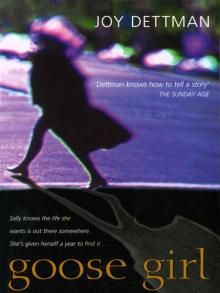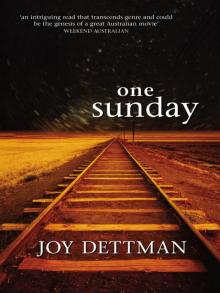- Home
- Joy Dettman
Pearl in a Cage Page 6
Pearl in a Cage Read online
Page 6
Amber howled a reply, believing her child, like Lazarus, had been raised from the dead. And Gertrude ran, passing the parson in the gateway. Punching bag or not, she was needed in there.
‘Bring him back. Make him bring my baby back.’
‘Shush, darlin’. Your baby couldn’t live. Shush now my darlin’ girl.’
Screaming, fighting the hands holding her. ‘Liars, all of you. I heard him.’
‘It’s that dead woman’s baby, darlin’. A little girl.’
Charles, the parson, carried the stranger’s baby into Norman’s house. He put it into Amber’s reaching arms.
And the world calmed.
A CRUMBLING HOUSE
Norman’s daughter, named for her paternal grandmother, was a Duckworth in the making. Still three months short of her fifth birthday, young Cecelia Louise was loud and chunky. She made Maisy Macdonald’s twin sons look like midgets. The past week spent over the road in a house so filled with Macdonald children, her own demands had gone unheard. She was home now.
Her grandmother, who had gone missing, was still missing. The other one, the Granny one who wore trousers, was there, but worse than that, there was a baby stuck to her mother’s chest. Young Cecelia Louise was not pleased with the alteration to her lifestyle.
‘Why did her come here for?’ she demanded, fists on her hips, in perfect mimicry of her missing grandmother.
The her, aimed at Gertrude, was intentionally misunderstood. ‘She’s a tiny wee girl who has no mummy, so your mummy is taking care of her.’
‘I don’ want dat fing and you too here. I want my granmuver here!’
Amber passed the infant to her mother and reached out to her daughter, but Cecelia Louise had lived through a wretched week and she wanted her mother to know about it. She threw herself to the floor where she lay on her back screaming and kicking herself around and around in circles.
Norman, drawn from his mother’s room by the noise, stood in the doorway, watching a fine display of spleen and wondering what freak chance of good luck prevented his daughter’s head hitting the leg of the bed or dressing table. His mother had made herself responsible for her granddaughter’s training. He’d had little to do with the girl, and had no idea of how he might interrupt her outrageous display.
‘Pick her up and put her on the bed,’ Amber directed.
Norman approached tentatively, reached for and caught a solid ankle, which halted his daughter’s foot-stamping circles but increased the intensity of her scream. He released her.
‘When are they removing . . . it?’ he asked.
Amber was buttoning her gown. The infant’s belly not yet full, her meal put away, she added her tremulous wail to Cecelia’s.
‘They’re waiting until the weather cools down,’ Gertrude said. Vern and his wife had agreed to deliver the infant to the city, though no one yet had claimed her.
‘And while he waits for the cool change, bedlam reigns in my house, Mother Foote.’
‘I’m keeping her alive, Norman,’ Amber said.
Out of her mind with grief on the night her son died, she may have convinced herself the child was her own. She’d changed a lot of napkins since.
‘Does the world require one more fatherless brat?’ he said, clearing the doorway as Gertrude vacated the room, taking a portion of the noise with her, but leaving behind the whirling, screaming dervish.
‘Lift her onto the bed,’ Amber said again. ‘She’ll hurt herself down there.’
‘What in God’s name is wrong with the girl?’
He did as he was bid. He grasped his daughter’s wrists, heaved her to her feet and set her on the bed. She slid off to the floor. He caught her, lifted her a second time, with similar results. On his third attempt, he hauled her screaming down the passage and into the nursery where he sat her on her bed and held her there.
‘Your mother is indisposed, Cecelia. You will remain here until you calm.’
She had other ideas. She kicked him low in the stomach and was off the bed and out the door before he got in breath enough to moan to the ceiling. ‘My house is crumbling, Mother. My house is crumbling.’
The cool change arrived in the early morning of the eighth day of January, the temperature plummeting to a pleasant seventy-eight degrees. Norman, freed from house and noise, was walking his station platform, enjoying the breeze, when Vern came across the lines.
‘Morning, Norm.’
Norman offered a tight smile. ‘Pleasant to feel a breath of air at last, Mr Hooper.’
Only since his relatives had used Hooper’s house as a hotel had he been on speaking terms with Vern.
‘We’ll be heading down to the big smoke this afternoon,’ Vern said.
Joanne saw her Melbourne doctor three or four times a year. There were doctors in Willama, an hour away by car on a good day, but the best doctors were in Melbourne and Joanne Hooper could afford the best.
Vern took his cigarettes from his pocket, slid one into his mouth and offered the tin. Norman, as had his mother, had long craved the acceptance of Woody Creek’s upper-crust. She’d gone to her grave without that acceptance. Now here was Vern Hooper, not the conventional upper-crust but certainly one of the town’s leading citizens, standing on the railway platform offering his cigarettes and seemingly in no hurry to leave. Norman wasn’t a smoker. His mother had not approved of the habit. But she wasn’t watching, and he was growing accustomed to not having her watch his every move, so he took a cigarette, accepted a light and puffed blue smoke into the morning air.
‘I was talking to your mother-in-law yesterday. She says Amber has done well by the infant.’
‘It appears so,’ Norman replied.
They made hard conversation until their cigarettes burned down, until Norman’s head, unaccustomed to the nicotine rush, felt light. He was relieved when Vern flicked his butt onto the train lines. He aped the action.
‘It won’t upset her — parting with the babe?’ Vern said.
‘She has done her Christian duty to a motherless child, Mr Hooper.’
‘Vern’s the name,’ Vern said, turning to go, then turning back. ‘I dare say Amber will fix up something for us to feed it during the trip?’
‘It shall be done . . . Vern.’
‘Righto then. See you at three, Norm,’ he said, and he crossed back over the lines.
Norman smiled. Some smiles open up a face, shine behind the eyes and invite the world to approach. Not Norman’s. His smile sucked his mouth in, taking his small nose with it; it inflated his sagging cheeks, forcing his jowls into many. Thankfully he didn’t do it often, though today, content with his world, the smile lingered a while.
Eight years ago he’d taken up residence in Woody Creek. For almost six of those years he’d been wed to a local girl; however, until his mother’s death, until the influx of his relatives, the loss of his son and the taking in of the stranger’s brat, he had been ignored by the community — unless they wanted to buy a train ticket. This past week no one had ignored him. The local minister had called by twice, and on the second occasion he had brought his wife along to sit with Amber. Several women of consequence had come to his door to enquire after Amber or to view the brat. Nancy Bryant had popped in twice, and on the second occasion she’d brought a tiny jacket she’d made for the infant. It was odd how that nameless sucking, soiling scrap of yowling humanity had crept into the psyche of this town.
Then yesterday. Again Norman’s jowls became many as his features disappeared in a smile. Yesterday, George Macdonald, husband of Maisy, who had billeted Norman’s three male Box Hill cousins, having learned from them that Norman had been an inveterate penny poker player as a boy, invited him to join his poker group.
‘A few of us get together on Friday nights, and seeing as I heard you were a bit of a card sharp in your youth, Norm, I thought you might like to come over,’ he’d said.
Baptised Norman, he had always been Norman, except to his school-wagging, Box Hill cousins. They’d ca
lled him Norm. Until yesterday, George Macdonald had called him Norman — or nothing. The shortened version of his name had a friendly ring to it, a country-town ring.
The infant was feeding when he popped over to the house to inform Amber of Vern Hooper’s arrangements, its tiny hand grasping at the milk-giving breast. It was barely human, though looking a little more so now than when it had arrived. He stepped nearer. Odd, he thought, how they are born with an instinct to feed and little else, each one much the same as the next. A strangely moving sight, that of a mother with a child at her breast — of course, they were not mother and child.
He coughed, announcing his presence. Amber lifted her head.
‘The Hoopers will be travelling today. Vern suggested you might prepare a feeding for the journey.’
Amber nodded. She was seated on a rocking chair, near the window.
‘Are you in a draught there, my dear?’
‘It’s a relief to feel cool,’ she said.
‘Indeed it is.’
He loved her dearly when she was happy, which was not a common state. She looked both happy and well this morning. He walked to the window where he reached around the chair to close the lower sash just a little. Close to her, the scent of new life was strong. He stood looking down at the milk-white breast, the tiny mouth fastened to it, and he felt moved to reach out a finger and touch the shell of pink ear. And the infant turned from the breast to his touch.
‘My word,’ he said. ‘It senses touch.’
‘I’m trying to feed her, Norman. She takes long enough without you disturbing her.’
‘Yes,’ he said. ‘Yes, indeed you are, my dear. Are those eyes blue perhaps?’
‘They’ll go brown. Her mother’s were brown.’
‘No doubt,’ he said, lingering close to his wife. ‘Cecelia was born with hair as I recall . . .’
‘All three were born with hair, Norman, and two of them are dead.’
‘Yes,’ he said, stepping away. ‘Yes, my dear.’
‘You may as well know now that I’m not going through that again.’
‘And you will not,’ he said. ‘You will not.’
The train was due in at three. It gave fair warning of its approach, then shunted around for twenty minutes while the flatbed carriages loaded high with bleeding red timber were connected. With the Hooper house only a sedate two minutes’ walk from the station, Norman had not expected Vern and his family to sit cooling their heels in his waiting room, but by two fifty-five, he was looking for them.
Their housekeeper crept up on him. ‘Morning, Mr Morrison,’ she said. ‘Mr Hooper said to tell you he’s so sorry to inconvenience you and your wife, but Mrs Hooper just took a bad turn. They won’t be travelling today after all.’
An inconvenience, certainly, though he made the correct mutterings, then watched the woman go on her way before hurrying across the station yard to inform Amber of the new arrangements.
The babe, packed into a large shopping basket, was on the kitchen table, Cecelia lying on the floor beneath the table, sucking sugared water from a titty bottle and Amber nowhere to be seen. He claimed the bottle. The ensuing scream brought Amber running.
‘Hooper’s wife has taken a bad turn. They are not going,’ he yelled, the bottle held out of Cecelia’s clawing reach.
‘Then let her have it, Norman!’
The train hooted up near Charlie White’s crossing. He had to go. He looked at the clawing girl, at Amber, at the titty bottle. Certainly Cecelia was missing his mother — as was he — but was that good reason to encourage errant behaviour?
She’d been weaned late from the breast, and after the death of their first son, Amber had clung to her living child, who’d returned willingly to the breast and remained there until Amber was again with child. They’d weaned her to a titty bottle, and very recently to cup. The reintroduction of that bottle into the house had raised memories of old habits, which must not be allowed to continue. The child was nearing school age. He took the bottle with him to the station.
Then, on Wednesday evening, he caught Amber putting that lump of a girl to bed with a bottle full of milk.
‘This will not do,’ he said.
‘Give it to her, Norman. I’m tired.’
‘You make a rod for your back.’
‘Give it to her, I said.’
‘I have spoken, Mrs Morrison. You will heed what I say!’
‘Go to hell, Norman,’ she said. She fought him for the bottle, the girl, out of her bed, stamping, screaming for it.
‘Is it your intention to send her to the classroom with a nipple in her mouth, Mrs Morrison?’
His voice, raised by necessity, added to the noise. He had to go, but had nowhere to go. He escaped, with the titty bottle, out the front door, and when they pursued him, he went the few steps further to his front gate, then out the gate. The town hall was directly opposite his house. Lights were showing over there tonight.
‘For God’s sake, Norman. Give it to her. I can’t take any more.’
Nor could he. His daughter’s scream was horrendous. For a moment he considered taking the easy road, the quiet road. If that girl been less Duckworth, he may have wavered, but he had memories of a great lump of a boy, head and shoulders above his classmates, running home from the terror of school to the comfort of his mother’s breast. A cowering shudder travelling from head to bowel, Norman stepped onto South Road, aware that his daughter, though she may not know it, was screaming out to be saved from herself, aware too that he must do the saving. He popped the teat, wasted the milk to the dust, then, bottle and teat in his trouser pocket, he crossed over the road towards the lights.
‘A lovely night, Mr Morrison,’ Jean White, wife of the grocer, said.
‘Very pleasant, Mrs White,’ he replied, or pleasant now he had placed some distance between himself and the noise — so pleasant, he followed Jean and Charlie White down the side of the town hall and into a rear meeting room where the Parents and Citizens’ Association members met each month. He was a parent. He was a citizen. He took a chair in the back row, then, head down, closed his eyes and thanked God for a town hall just over the road — or he thanked God until Tom Palmer nominated him for the vacant position of chairman.
Norman’s jowls lifted, his nostrils flared; he stared, not expecting the nomination to be seconded. Jean White seconded it, and minutes later, Norman found himself duly elected and sitting up front with the secretary.
At ten fifty-five, he called the meeting to a close and crept home, afraid of his reception there, but more pleased with himself than he’d felt in twenty years. The house was silent. He crept around to the rear verandah, felt out his mother’s cane chair and eased himself down to it, eager to relive his night of glory.
He had never attended town meetings when his mother was alive. She had made her presence felt at most, though was never nominated for office. In the eight years he’d been in Woody Creek, he had never volunteered his services to the town. Always embarrassed by his abbreviated education, cut short at sixteen; however, comparatively speaking, that made him an educated man in this town. The timber industry demanded brawn not brain.
He drew a breath, released it; wished he had a cigarette and smoke to release. Two had been offered tonight. He’d accepted both and the sweet scent of tobacco clung to his clothing as the sweet scent of acceptance clung to his soul. Such a heady brew, and previously untasted by Norman.
Much had changed since his mother’s death. He had never spoken to the Bryants until they’d offered to take in a few of his relatives. Lonnie Bryant was a wealthy man, his family one of the oldest in the district. Norman had had little to do with the Hoopers or the Whites before his mother’s death. Now Nancy Bryant visited his house, Jean White always passed the time of day, Vern Hooper had offered his cigarettes and his given name.
Norman’s financial situation had also received a shake-up. As his mother’s only beneficiary, he’d inherited her all, which he’d believed would be a m
eagre fifty pounds a year from his grandfather’s estate. But she’d had four hundred pounds invested in a government loan, paying interest of four and a half per cent, which would net an extra eighteen pounds a year. She’d had seven hundred pounds in a bank account, at a miserly interest, but even that earned fourteen pounds per annum — and not one penny, not one brass farthing, had she paid into the running of his house. His stationmaster’s wage was poor. There had been times when, if not for careful management and his mother-in-law’s free supply of eggs and garden produce, he may have struggled to supply some basic need.
‘Not one farthing,’ he muttered to the night. ‘And not once did I question her financial situation.’
Cecilia Morrison had not encouraged questions.
However, her miserly hoardings, when added to his stationmaster’s income, made him a man of means — and a worthy chairman of the Parents and Citizens’ Association.
The Hooper family put off their city trip until Vern’s daughters were due to return to boarding school and university in early February. Norman hid the titty bottle in his ticket office. Cecelia’s behaviour continued to deteriorate. The babe continued to thrive. Gertrude’s horse spent long hours tied in the shade of the currajong tree in the station yard, and Norman spent long nights standing beside his mother’s vacated bed, studying his wife’s sleeping face.
He slept alone now. His movement in their shared bed, his snoring, even his breathing, disturbed Amber — though not so Cecelia’s breathing. She had been removed from the nursery to share that second double bed. He found himself studying the small replica of his mother, and at times wondering how his fine-featured wife had produced such a child.
The stranger’s infant now slept in the nursery. He studied it at night, touched a shell ear with an index finger, much as he might have touched a stray kitten dumped in his backyard. And each time his finger dared to touch, that seeking mouth turned to him.

 The Hope Flower
The Hope Flower Trails in the Dust
Trails in the Dust Diamonds in the Mud and Other Stories
Diamonds in the Mud and Other Stories Moth to the Flame
Moth to the Flame The Tying of Threads
The Tying of Threads Wind in the Wires
Wind in the Wires The Seventh Day
The Seventh Day Thorn on the Rose
Thorn on the Rose Jacaranda Blue
Jacaranda Blue Mallawindy
Mallawindy Ripples on a Pond
Ripples on a Pond Goose Girl
Goose Girl The Silent Inheritance
The Silent Inheritance Henry’s Daughter
Henry’s Daughter Yesterday's Dust
Yesterday's Dust Pearl in a Cage
Pearl in a Cage One Sunday
One Sunday